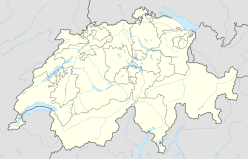Aletsch Glacier
| Grosser Aletschgletscher | |
|---|---|

Lower part of the glacier with Wannenhorn (3,906 m (12,815 ft)) in the middle and Strahlhorn (3,026 m (9,928 ft)) on the right
|
|
|
Location in Switzerland
|
|
| Type | Valley glacier |
| Location | Valais, Switzerland |
| Coordinates | 46°26′32″N 8°4′38″E / 46.44222°N 8.07722°ECoordinates: 46°26′32″N 8°4′38″E / 46.44222°N 8.07722°E |
| Area | 81.7 km2 (31.5 square miles) (2011) |
| Length | 22.6 km (14.0 miles) (2014) |
| Thickness | 940 m (Konkordiaplatz) |
| Highest elevation | 4160 m |
| Lowest elevation | 1650 m |
| Terminus | Massa |
| Status | Retreating |
The Aletsch Glacier (German: Aletschgletscher) or Great Aletsch Glacier (Grosser Aletschgletscher) is the largest glacier in the Alps. It has a length of about 23 km (14 mi) (2014), has about a volume of 15.4 km3 (3.7 cu mi) (2011), and covers about 81.7 km2 (31.5 square miles) (2011) in the eastern Bernese Alps in the Swiss canton of Valais. The Aletsch Glacier is composed of four smaller glaciers converging at Concordia, where its thickness was measured by the ETH to be still near 1 km (3,300 ft). It then continues towards the Rhône valley before giving birth to the Massa.
The whole area, including other glaciers is part of the Jungfrau-Aletsch Protected Area, which was declared a UNESCO World Heritage Site in 2001.
The Aletsch Glacier is one of the many glaciers located between the cantons of Bern and Valais on the Bernese Alps located east of the Gemmi Pass. The whole area is considered to be the largest glaciated area in western Eurasia. The Fiescher and Aar Glaciers lying on the east have similar extensions.
Except the Finsteraarhorn, all the highest summits of the Bernese Alps are located within the drainage basin of the glacier. The Jungfrau and Mönch constitute the northern boundary; the Gross Fiescherhorn and Gross Wannenhorn lie on its east side; finally the culminating point, the Aletschhorn (4,193 m (13,757 ft)) is located on the west side.
...
Wikipedia

